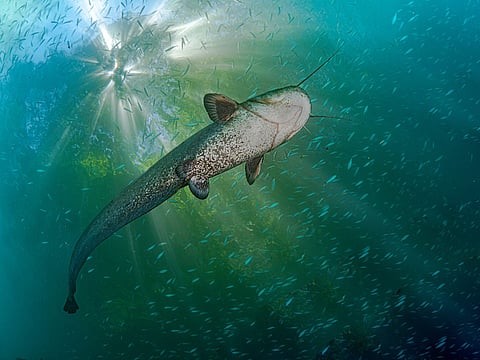

Continuing its commitment to sustainable aquaculture as a key element of global food security, the Food and Agriculture Organization of the United Nations (FAO) is joining a new plan to support farmed catfish in Nigeria. The goal is to make African catfish production more resilient, efficient, and environmentally friendly. This will not only provide more affordable food for Africa's most populous nation but also create new jobs and business opportunities.
The plan falls under the FISH4ACP initiative, a development program that contributes to food and nutrition security, economic prosperity and job creation by ensuring the economic, social and environmental sustainability of fisheries and aquaculture value chains in Africa, the Caribbean and the Pacific.
Nigeria is the world's largest producer of African catfish. According to an analysis conducted by FISH4ACP and the country's Federal Ministry of Agriculture and Rural Development, in 2021 annual production was estimated at 1 million tons worth around USD 2.6 billion (EUR 2,413 million). With more than 223 million people, Nigeria is also the most populous nation in Africa.
The same analysis also showed the importance of catfish as a source of income in the country. Nigeria has approximately 285,000 producers, of which more than 60% are smallholder farmers. The catfish value chain provides employment for about 1 million people in the country.
However, after 10 years – between 2005 and 2015 – having annual growth above 20%, catfish production began to decline in 2016 due to rising production costs and a drop in demand fueled by inflation and the devaluation of the national currency.
"Catfish has been key in feeding Nigeria's growing population and has improved the livelihoods of many people in our country," said Dr. Ernest A. Umakhihe, Permanent Secretary of the Federal Ministry of Agriculture and Rural Development at the presentation of the strategy yesterday in Abuja, the capital. "To maintain this vital role and face future challenges, new ways are needed to make the sector more resilient and efficient," he added.
The result of a dialogue involving public and private sector stakeholders, the plan presented yesterday is intended as a response to the demand for new ways to improve the African catfish sector in Nigeria. The improvement strategy sees opportunities primarily in increased efficiency, including improved practices in the production, management, and distribution of feed, fingerlings and fish. The ultimate goal is to reduce production costs and thus also reduce catfish prices to a more affordable level to meet strong market demand.
Moreover, the project will promote specific policies to strengthen the enabling environment for catfish farming in Nigeria and work with partners, including in finance, on schemes to provide feed to fish farmers on credit. Not only that, FISH4ACP will also support fish processors to adapt cleaner smoking methods that reduce harm to human health and the environment.
"FAO is happy to support Nigeria in a blue transformation of the catfish sector, which is so vital for food security, the economy and people's livelihoods," said FAO's Representative in Nigeria, Fred Kafeero. "FISH4ACP can be an agent of this change and ensure that the benefits will be shared equitably and sustainably," he continued.
To achieve this, FISH4ACP will lead by example by working with selected groups of farmers, as well as fish markets, on good management and production practices, which could be adopted throughout the sector.
FISH4ACP is a global fish value chain development programme led by the Organisation of African, Caribbean and Pacific States (OACPS), implemented by FAO and funded by the European Union (EU) and the German Federal Ministry for Economic Cooperation and Development (BMZ).
Its objective is to improve the productivity and competitiveness of twelve fisheries and aquaculture value chains in twelve OACPS member countries, ensuring that economic improvements go hand in hand with environmental sustainability and social inclusion. FISH4ACP pays special attention to small and medium-sized enterprises because of their potential to generate economic and social benefits, particularly for women and youth.
